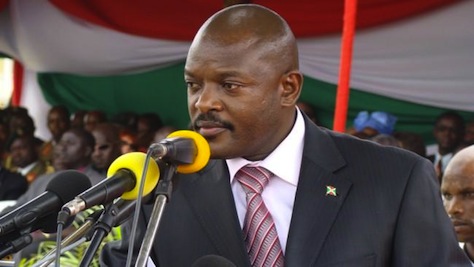The troubled east African country of Burundi has set its parliamentary and presidential election dates, establishing the timeline by which Burundi’s fragile government could fall into political (or even ethnic) conflict.![]()
Burundi will hold parliamentary elections on May 26, 2015 with its presidential election to take place exactly one month later on June 26.
Isolated as the poorest and the only French-speaking country within the mostly English-speaking East African Community (EAC), Burundi has increasingly assumed an atmosphere of fear and repression as the 2015 elections approach. It’s widely believed that Burundian president Pierre Nkurunziza is planning to seek a third term in office, despite constitution restrictions to the contrary.
* * * * *
RELATED: As world remembers Rwanda genocide,
Burundi tilts into political crisis
* * * * *
That’s left the Burundian opposition increasingly soured on participating the upcoming vote, and it could well boycott the 2015 elections, much as it did the 2010 elections.
Even if Nkurunziza declines to run, pulling back from the brink of a political crisis, his governing Conseil National Pour la Défense de la Démocratie–Forces pour la Défense de la Démocratie (CNDD-FDD, National Council for the Defense of Democracy–Forces for the Defense of Democracy) will almost certainly try to keep a tight grip on power. With the increasing stranglehold that Nkurunziza has taken over the country in the past decade, however, that shouldn’t prove difficult.
Burundi’s current government sprang out of the 2000 Arusha accords, which ended a decade-long civil war between Burundi’s Hutu majority and Tutsi minority, along lines that reflected the much more well-known violence in neighboring Rwanda.
Whereas Rwanda’s post-war president Paul Kagame has worked to eliminate ethnic identity on Tutsi/Hutu lines and has attracted significant foreign investment and remarkable development, Burundi has had a much harder time in the ensuing decade. Its parliament remains divided on ethnic lines, with 40% of the seats guaranteed to the Tutsi minority and 60% to the Hutu majority. While Rwanda remains the darling of African investment, Burundi has struggled — Rwanda garnered 264 times as much foreign investment as Burundi in 2012.
Nkurunziza seems to realize he could face a tough fight for reelection and he’s accordingly passed laws to restrict individual freedoms throughout Burundi. Last year, he implemented a tough new press law restricting the freedom of journalists. Most recently, he introduced a measure that forbids jogging in large groups, lest the group activity lead to something more subversive than cardiovascular health. For the same reason, Burundi also recently limited church congregations by setting a minimum membership for local churches of 500 worshippers. His government tried to have Alexis Sinduhije, the leader of the cross-ethnic Mouvement pour la solidarité et le développement (MSD, Movement for Solidarity and Development), arrested in Belgium earlier this year, and it has arrested dozens of political opponents.
The Forces nationales de libération (FNL, National Forces of Liberation, formerly PALIPEHUTU), which was the last major rebel group to sign the Arusha accords in 2008, is rumored to be rearming in advance of next year’s elections, which could also present a significant challenge to Nkurunziza’s rule.
Most ominously, there are reports that Nkurunziza and the CNDD-FDD are arming its youth militia, the Imbonerakure, which could quickly accelerate bloodshed during any political crisis, similar to the role that the Interahamwe, Hutu youth militias, played during the 1994 Rwandan genocide.
Though Burundi could still avoid political fighting, and the path to ethnic fighting is still far-fetched, it’s a warning sign that the Union pour le Progrès national (UPRONA, Union for National Progress), Burundi’s largest Tutsi political party, recently left the government after years of being co-opted by Nkurunziza into a unity coalition.
